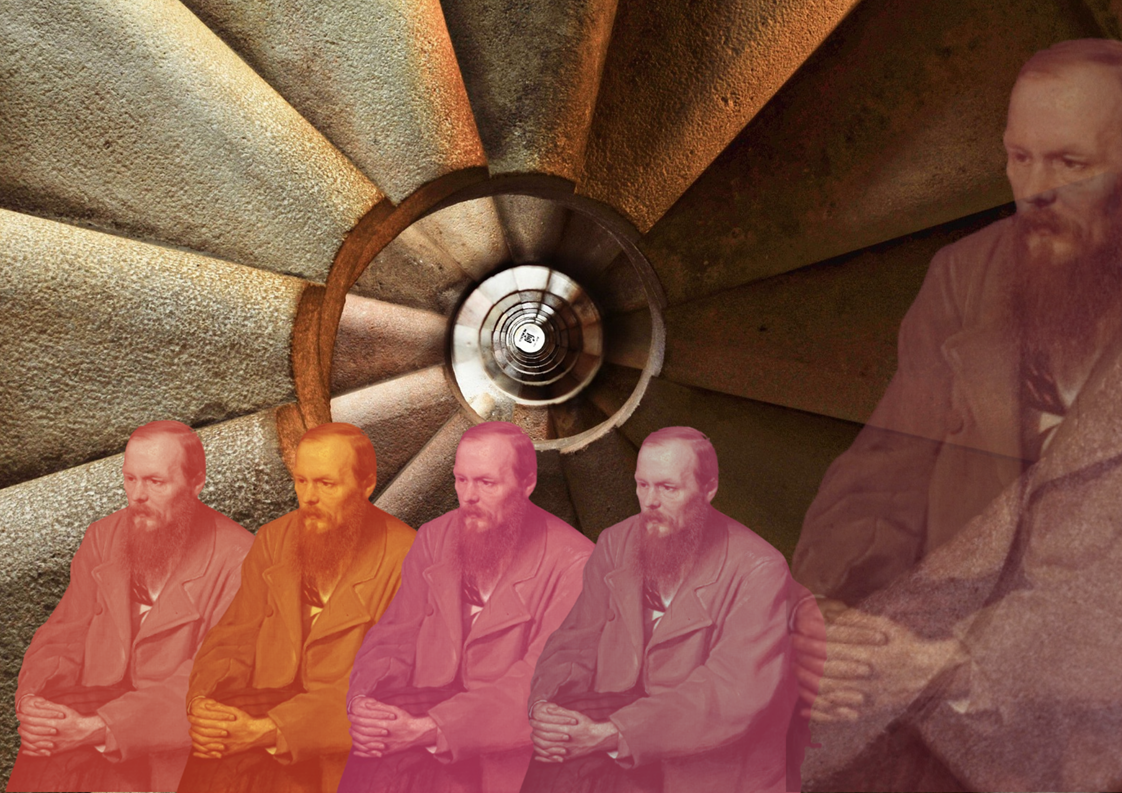In Fyodor Dostoevsky’s novels, the human soul does not behave. It does not align neatly with rules or glide along predictable trajectories. It does not obey reason. And it certainly does not submit to geometry.
But geometry of all things was one of the more potent metaphors Dostoevsky used to wage his war against the Enlightenment’s dream of a rational, orderly universe. He was less concerned with triangles and proofs than with what they represented: a vision of reality that was comprehensible, calculable, and ultimately closed. The kind of world where two plus two equals four and that’s the end of the conversation.
But for Dostoevsky, that was the problem. Two plus two equals four was a threat, not a triumph.
In his fiction, particularly in Notes from Underground, Crime and Punishment, and The Brothers Karamazov, Dostoevsky mounts a sustained rebellion against what might be called the Euclidean worldview. Not Euclid the man, but Euclid as a symbol: of flatness, of finality, of a moral and metaphysical system that leaves no room for the divine contradiction of human freedom. Against this, Dostoevsky proposes something messier, more frightening, and more true a non-Euclidean anthropology of the soul.
The Tyranny of the Logical World
To understand the force of Dostoevsky’s critique, we must first understand the allure of what he opposed. Euclidean geometry, codified in ancient Greece and canonized in the Enlightenment, offered a vision of the world as rational and orderly constructed from axioms, governed by proofs, and graspable by the human mind. By the 19th century, that worldview had extended well beyond mathematics. Philosophers, social reformers, and utilitarians were increasingly convinced that morality, too, could be rendered logical. Jeremy Bentham dreamed of calculating pleasure and pain like currency; Russia’s own Nikolai Chernyshevsky envisioned a future where reason ruled desire, and the individual could be optimized like a machine.
Dostoevsky saw in this intellectual optimism a profound spiritual danger. What if this radiant future stripped humanity of its chaos, its depth, its capacity for suffering and for grace? What if the price of reason was the annihilation of the soul?
The Underground Man and the Revolt Against Arithmetic
Notes from Underground (1864) is Dostoevsky’s first explicit articulation against rationalist humanism. Its narrator bitter, brilliant, and unnamed lashes out at the notion that human beings will inevitably act in their own best interest once they are properly enlightened. The utopian rationalism of his time imagines people as programmable entities: predictable, perfectible, and pathetically tame.
But the soul, he insists, does not work like that.
“I admit that twice two makes four is an excellent thing,” he says, “but… twice two makes five is sometimes also a very charming little thing.”
It is a strange sentence, and a pivotal one. “Twice two makes four” becomes a metonym for everything fixed, rational, and deadening in modern thought. “Twice two makes five” is not a rejection of mathematics, but a rebellion against its tyranny, a cry for the irrational dignity of the human will. It is a protest against being reduced to piano keys, “played” by the laws of nature and society. In that cry is the essence of Dostoevsky’s metaphysics: to be human is to suffer, to choose, to contradict.
The Curved Universe of Faith
In The Brothers Karamazov (1880), this metaphysical rebellion finds its most haunting expression in Ivan Karamazov the intellectual brother, the sceptic, the tragic. Ivan’s anguish lies not in disbelief, but in belief that cannot reconcile itself with suffering. In a famous dialogue with his brother Alyosha, he speaks not as an atheist but as a man whose heart breaks at the existence of evil.
“It’s not God I don’t accept, Alyosha,” he says. “It’s the world He created.”
Ivan introduces a striking metaphor: the human mind, he says, is confined to “Euclidean intelligence.” That is, our reasoning is locked within a system that can comprehend only flat, finite, causal relations. If divine justice exists, it belongs to a higher geometry a non-Euclidean one, where contradictions are not just possible but necessary.
By the time Dostoevsky was writing, non-Euclidean geometry had already entered the scientific imagination, through the works of Lobachevsky and Riemann. The idea that space itself might be curved, and that the axioms of Euclid might not apply universally offered a fitting analogue to Ivan’s spiritual dilemma. Where reason reaches its limits, Dostoevsky implies something else must take over: not more logic, but faith.
The Moral Failure of Mathematics
Crime and Punishment (1866) completes the triangle. In Raskolnikov, we find a man who tries to apply the calculus of utilitarian ethics to human life. One death, one of a cruel, unloved pawnbroker can purchase the good of many. He sees himself as a Napoleon, outside the law, performing an act of moral arithmetic.
And yet the crime does not liberate him. It shatters him. The guilt he feels is irrational, overwhelming, and utterly incompatible with the equation he believed in. Reason fails. What remains is conscience: inexplicable, holy, and irreducible.
Dostoevsky’s point is devastating in its simplicity. No sum can explain the soul. No formula can contain the cry of a child or the pangs of remorse. The human being is not a number, but a mystery.
The Soul as Non-Euclidean Space
In opposing the Euclidean worldview, Dostoevsky was not attacking mathematics. He was exposing the violence of systems that presume to explain everything especially human suffering, evil, and love.
The Enlightenment dream of perfect knowledge, he believed, eroded the very conditions that make us human: the capacity for contradiction, for error, for redemptive suffering.
In that sense, Dostoevsky was a prophet of the 20th century. Long before Camus or Sartre, long before the “death of the subject” or the rise of post-structuralism, he declared the inadequacy of any system that leaves out the absurd, the divine, the broken. He offered instead a vision of life as a non-Euclidean space a realm of impossible intersections and sacred paradoxes.
His characters do not seek symmetry. They seek meaning.
And in their pursuit, they remind us that freedom, true freedom is not the ability to choose what is rational. It is the right to choose what is not.
Works Cited
- Dostoevsky, Fyodor. Notes from Underground. Trans. Richard Pevear and Larissa Volokhonsky, Vintage, 1993.
- —. The Brothers Karamazov. Trans. Pevear and Volokhonsky, Farrar, Straus and Giroux, 2002.
- —. Crime and Punishment. Trans. Oliver Ready, Penguin, 2014.
- Frank, Joseph. Dostoevsky: A Writer in His Time. Princeton University Press, 2009.
- Berlin, Isaiah. “The Hedgehog and the Fox.” Russian Thinkers, Penguin, 1994.
- Lobachevsky, Nikolai. Foundations of Geometry. Dover, 1956.



